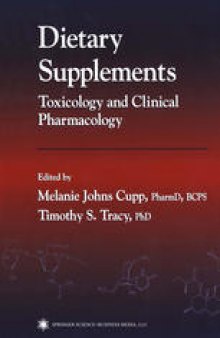 جزییات کتاب
جزییات کتاب
While sales of dietary supplements have skyrocketed in recent years, information about their safety and efficacy in humans is generally sparse in comparison with what is available for prescription drugs. Dietary Supplements: Toxicology and Clinical Pharmacology presents, in both comprehensive and summary formats, a wealth of objective information for a selection of significant nonherbal dietary supplements. The supplements detailed were chosen for their popularity, toxicity, and the quantity and quality of information available, and include such well-known agents as DHEA, androstenedione and other over-the-counter steroids, coenzyme Q10, fish oil, glucosamine and chondroitin, chitosan, chromium picolinate, creatine, vanadyl sulfate, SAMe, and melatonin. Additional coverage is given to colloidal silver, shark cartilage, germanium, red yeast rice extract, l-tryptophan, N,N-dimethylglycine, GHB and GBL, huperzine, hydrazine, methylsulfonylmethane, and pyruvate. Each monograph discusses the history of the compound; its chemical structure; its current and promoted uses, sources, and chemical composition; and its toxicity, pharmacokinetics, and physiological role. Also presented are case reports of their adverse effects and interactions, as well as information on their reproductive effects, chemical and biofluid analysis, and regulatory status. Each chapter is based on original studies published in reputable peer-reviewed journals, as well as on meta-analyses, systematic reviews, or other high-quality assessments by recognized experts. Authoritative and objective, Dietary Supplements: Toxicology and Clinical Pharmacology offers physicians, pharmacologists, pharmacists, toxicologists, and medical examiners a treasure trove of uncommon-but reliable-scientific and clinical information on the toxicity and usefulness of today's leading nonherbal dietary supplements.



 دانلود کتاب
دانلود کتاب

 جزییات کتاب
جزییات کتاب





 این کتاب رو مطالعه کردید؟ نظر شما چیست؟
این کتاب رو مطالعه کردید؟ نظر شما چیست؟
